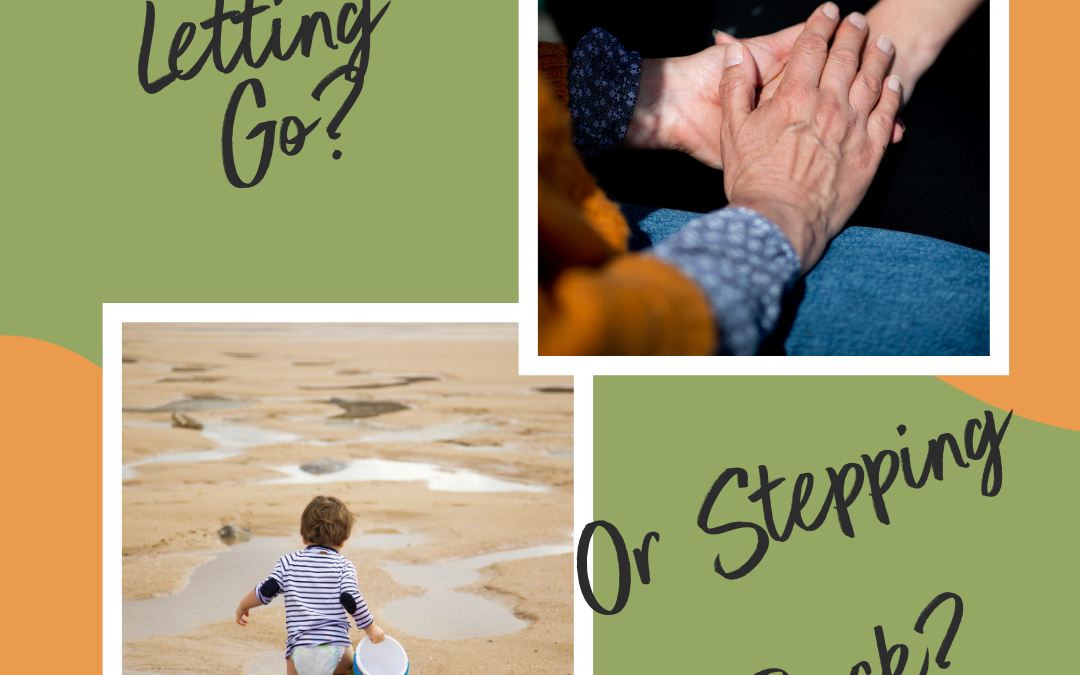There is a difference between letting go and stepping back.
Letting go has an air of giving up, of throwing your hands in the air in a gesture of I just don’t know. It carries the unconscious energy of ‘It’s too big, it’s too hard, I give up.”
Letting go is a release. The problem is, the underlying issue is still there. It hasn’t gone away. And it will come back later, in a different form, ready to bite you.
Stepping back is different. While you’re letting go, you’re still there. Available. Ready to show you care by listening, supporting, working through the issue together.
Only you’re no longer in the center of the stage with your teenager. Instead, you’re out to the side. There if they need you. Cheering them on every step of the way.
And let them get on with it.
Stepping back allows your young person to take up the space. To shine. To be able to take their best steps forward.
When your child was learning to walk, you had to leave them to do all the preparation work. They had to learn to roll over by themselves. To strengthen their core muscles by sitting. To pull themselves up. To balance. The only way you could teach your baby to do those things was by being a good role model yourself. You sat without flopping over. You stood up without losing your balance. You walked around in the world with confidence, taking sure and purposeful steps as you walked from the table to the bench.
Your child saw you do these things. They watched you. And they modeled themselves on what you were doing.
Stop.
Remember that look in their eyes when they first did those things. Pride. Confidence. Accomplishment. The pleasure they took in sharing that achievement with you.
Their first steps were watched, discussed, talked about. As a parent, you were so proud of them. Because they’d learned to walk. By themselves. They’d put the pieces of a complex task together inside their brains. And it showed. They had now moved from baby to toddler. A huge achievement for such a little person.
And their learning meant your job changed. Instantly. You now had to watch their environment. To create a space where they could keep learning and growing in safety. You let go of the idea of them learning to walk, and instead, you made space for them to walk safely.
Fast forward to the teenage years. You are still balancing between teaching your teenager how to move around in the world and letting them practice by themselves. Your role is now to guide them. It’s not letting go because you give up. It’s stepping aside to give them space to learn.
Your teenagers are coming through. Step back and give them the space they crave to blossom. To show you what they are made of.
Our parental role has changed. We now position ourselves to support them by:
- Being within arm’s reach to help them up.
- Appreciating their attempts to live their best life
- Encouraging them to share their thoughts with you
And this is where it gets tricky…
All of a sudden they are wondering what you’re going to say about what they’re up to. They are judging themselves by the judgement they think you are going to pass on them. You, in fact, may not be thinking any of those things. However, unless you’re talking with your adolescent, how will they know that? This leads to the next question.
How do you get deep, meaningful, and useful conversations started with your teen?
It’s not going to happen overnight, especially if it’s something that’s been slowly slipping away. Encourage them by stepping aside, and letting them know you’re still there by asking them questions like:
- How can I help you?
- What support do you need?
- What do you think?
They possibly won’t know the answers to these questions straight away, so let them think about it with a promise to get back to you.
And when they do get back to you, your job is to listen. And to let them know you’ve heard them by saying, “What I hear you say is ….” or, “It sounds like you think ….” and then wait for them to say, “Yes, that’s right.” Or, “No. That’s not what I meant.”
They might be telling you a story about their friend and what that friend said to another friend. And what happened when they tried to intervene. Listen. Then say, “I hear you saying that you don’t like the way (insert name) handled that situation.” Wait for them to acknowledge that you are on their page. They will either say, “Yes, that’s right.” Or, “No. That’s not what I meant.” Either way, it’s a win. If they say, “Yes,” use an open question. “What would you do differently?” Or, “What are your thoughts about that?” And listen (reflectively) to what they tell you. Opening the door for your adolescent to lead the conversation is the biggest gift you can give them.
Don’t be tempted to throw in the fix-it solutions, or the character assassination of the friend the story is about. Stick to the issue, enjoy the conversion and let the rest go. Just by being able to air their thoughts, your teenager will have a much firmer handle on what’s going on in their brains. And that translates to a more confident and capable teenager running their life.
If you think about throwing your hands up in despair and saying “this isn’t working” then step sideways. There is a better way. For those of you this post resonates with, come and coach with me. Click here to book a connection call and take your next step forward.

